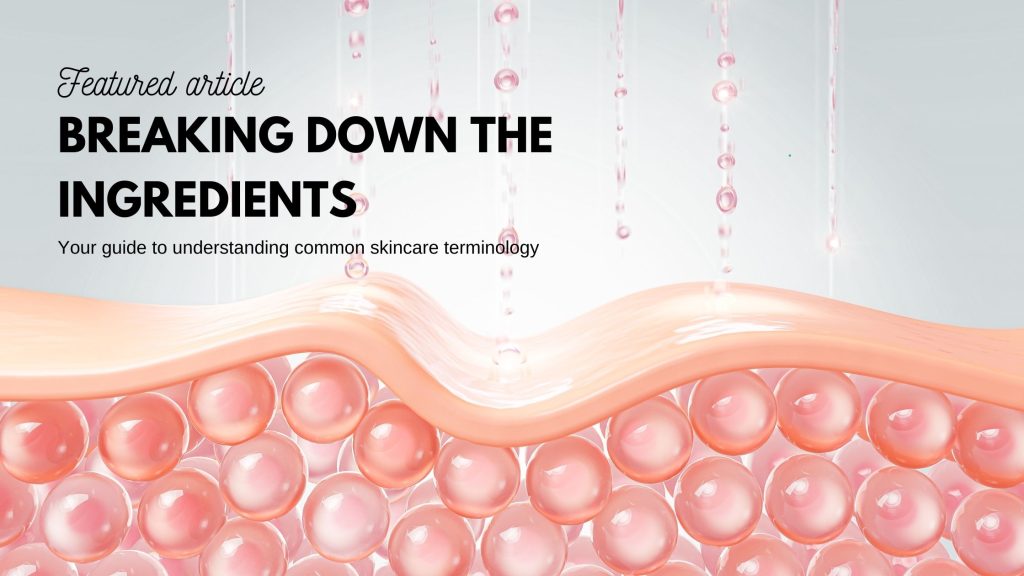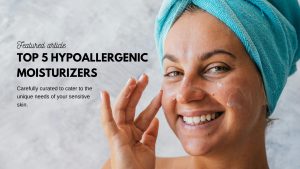We fairly and honestly review all the products on our site. At the same time, we permit brands featured on our site to promote our site and we may earn a commission if you buy through links we provide. Learn more about our review process and disclaimers
Breaking Down the Ingredients: Understanding Common Skincare Terminology
Deciphering the cryptic language of skincare ingredients
![]() From the team at Cosmetics Report Updated: Jan 13th, 2026
From the team at Cosmetics Report Updated: Jan 13th, 2026

When we think about getting healthier, more radiant skin, it often involves deciphering the seemingly cryptic language of skincare ingredients. From alpha hydroxy acids to retinoids, the world of skincare can be overwhelming for many. In this guide, we are breaking down the most common skincare terminology, shedding light on ingredients that are the building blocks of your favorite skincare products. Better understanding these components will empower you to make informed choices for your skincare routine, ensuring that you give your skin the care it deserves.
Alpha Hydroxy Acids (AHAs)
Alpha Hydroxy Acids (AHAs) are a group of water-soluble acids derived from various fruits, milk, and sugar cane. They are widely used in skincare products due to their exfoliating and skin-rejuvenating properties.
Some common types of AHAs include:
Glycolic Acid:
Known for its exfoliating properties, glycolic acid is derived from sugarcane. It helps remove dead skin cells, promotes cell turnover, and can improve the appearance of fine lines and uneven skin texture.
Lactic Acid:
Derived from milk, lactic acid is a gentler AHA suitable for sensitive skin. It exfoliates, hydrates, and brightens the complexion, making it a versatile ingredient in various skincare formulations.
Citric Acid:
Found in citrus fruits, citric acid acts as an antioxidant and exfoliant. It helps in brightening the skin and can contribute to a more even skin tone.
Beta Hydroxy Acids (BHAs)
Beta Hydroxy Acids (BHAs) are a class of chemical compounds used in skincare products for their exfoliating and acne-fighting properties. Unlike Alpha Hydroxy Acids (AHAs), which are water-soluble, BHAs are oil-soluble, allowing them to penetrate deep into the pores to unclog and dissolve excess sebum, dead skin cells, and other impurities.
Salicylic Acid:
The most common BHA used in skincare products is salicylic acid. Salicylic acid is derived from willow bark and has anti-inflammatory, antibacterial, and comedolytic properties, making it highly effective in treating acne-prone skin.
Here are some key characteristics and benefits of Beta Hydroxy Acids, specifically salicylic acid:
- Unclogs Pores: BHAs, such as salicylic acid, are especially effective at penetrating the oil glands and pores of the skin. By dissolving the buildup of dead skin cells, excess oil, and debris within the pores, salicylic acid helps to prevent and treat acne breakouts, blackheads, and whiteheads.
- Exfoliates the Skin: Similar to AHAs, BHAs have exfoliating properties that help to promote cell turnover and reveal smoother, clearer skin. By removing the outer layer of dead skin cells, salicylic acid can improve skin texture, minimize the appearance of pores, and enhance overall radiance.
- Anti-inflammatory: Salicylic acid has anti-inflammatory properties that help to reduce redness, swelling, and irritation associated with acne and other inflammatory skin conditions. It can help soothe and calm irritated skin, making it a beneficial ingredient for those with sensitive or acne-prone skin.
- Targets Acne: BHAs are particularly effective at targeting acne because of their ability to penetrate deep into the pores and dissolve the buildup of sebum and bacteria that contribute to breakouts. Salicylic acid can help prevent new acne lesions from forming while also reducing the severity and duration of existing breakouts.
- Regulates Oil Production: By regulating sebum production, salicylic acid helps to prevent the skin from becoming excessively oily, which can contribute to acne and other skin issues. It helps to balance oil levels, keeping the skin looking matte and less prone to shine.
Retinoids
Retinoids are a class of compounds derived from vitamin A that are widely used in skincare for their numerous benefits, including anti-aging, acne treatment, and overall skin rejuvenation. Retinoids work by influencing skin cell turnover, stimulating collagen production, and promoting the growth of new, healthy skin cells.
Retinol:
Retinol is the most common form of over-the-counter retinoid. It is converted into retinoic acid (the active form of vitamin A) once it is absorbed by the skin. Retinol helps to stimulate collagen production, reduce the appearance of fine lines and wrinkles, improve skin texture and tone, and promote a more youthful complexion. It is suitable for most skin types and is available in various concentrations to accommodate different sensitivities.
Retinaldehyde:
Retinaldehyde is a slightly more potent form of retinoid than retinol. It is converted into retinoic acid more rapidly, making it more effective at addressing signs of aging and acne. Retinaldehyde is often used in anti-aging skincare products to promote collagen synthesis and improve skin firmness and elasticity.
Retinoic Acid (Tretinoin):
Retinoic acid is the active form of vitamin A and is available by prescription. It is the most potent and effective retinoid for treating acne and reducing the appearance of wrinkles, hyperpigmentation, and other signs of aging. Tretinoin works by speeding up cell turnover, unclogging pores, and promoting the shedding of dead skin cells. It can be highly effective but may also cause irritation, dryness, and sun sensitivity, so it should be used under the guidance of a dermatologist.
Hyaluronic Acid
Hyaluronic acid (HA) is a naturally occurring substance found in the human body, particularly in the skin, connective tissues, and eyes. It plays a crucial role in maintaining hydration, lubrication, and elasticity in the skin. Despite its name, hyaluronic acid is not actually an acid in the traditional sense; rather, it is a type of sugar molecule (glycosaminoglycan) that holds water and helps keep tissues moist and well-hydrated.
Here’s a closer look at the properties and benefits of hyaluronic acid in skincare:
- Hydration: One of the key functions of hyaluronic acid is its ability to hold and retain moisture. It has an incredible capacity to bind water molecules, holding up to 1000 times its weight in water. This hydration helps to plump up the skin, improve elasticity, and reduce the appearance of fine lines and wrinkles.
- Skin Barrier Support: Hyaluronic acid contributes to the integrity of the skin barrier, which is essential for maintaining healthy and balanced skin. By strengthening the barrier function, hyaluronic acid helps to protect the skin from external aggressors, pollutants, and irritants, while also preventing moisture loss.
- Skin Repair and Regeneration: Hyaluronic acid plays a role in wound healing and tissue repair by promoting cell proliferation and migration. It helps to accelerate the healing process, reduce inflammation, and minimize the risk of scarring.
- Anti-Aging Effects: As we age, the natural production of hyaluronic acid in the skin decreases, leading to dryness, loss of elasticity, and the formation of wrinkles. By replenishing hyaluronic acid levels through skincare products, such as serums and moisturizers, it can help restore hydration, firmness, and youthfulness to the skin.
- Compatibility with All Skin Types: Hyaluronic acid is well-tolerated by most skin types, including sensitive, dry, oily, and acne-prone skin. It is lightweight, non-comedogenic, and unlikely to cause irritation or allergic reactions, making it suitable for virtually everyone.
Antioxidants
In the skincare world, antioxidants play a crucial role in protecting the skin from damage caused by free radicals, environmental stressors, and UV radiation. Antioxidants are molecules that neutralize free radicals, which are unstable molecules that can cause oxidative stress and damage to cells, including skin cells. By scavenging free radicals, antioxidants help to prevent premature aging, reduce inflammation, and promote overall skin health.
Here are some common antioxidants used in skincare and their benefits:
- Vitamin C (Ascorbic Acid)
Vitamin C is a potent antioxidant that helps to brighten the skin, even out skin tone, and protect against UV-induced damage. It promotes collagen production, reduces the appearance of fine lines and wrinkles, and improves skin texture and elasticity. Vitamin C is also known for its anti-inflammatory properties, making it effective in calming redness and irritation.
- Vitamin E (Tocopherol)
Vitamin E is a powerful antioxidant that helps to protect the skin from free radical damage and oxidative stress. It moisturizes and nourishes the skin, strengthens the skin barrier, and enhances its natural defense mechanisms. Vitamin E also works synergistically with vitamin C to boost its antioxidant effectiveness. - Green Tea Extract
Green tea extract is rich in polyphenols, particularly epigallocatechin gallate (EGCG), which have potent antioxidant and anti-inflammatory properties. Green tea helps to neutralize free radicals, reduce oxidative stress, and protect the skin from UV-induced damage. It also has soothing and calming effects on the skin, making it suitable for sensitive and irritated skin. - Resveratrol
Resveratrol is a naturally occurring compound found in grapes, berries, and red wine. It is a potent antioxidant that helps to protect the skin from environmental aggressors, such as pollution and UV radiation. Resveratrol also has anti-inflammatory properties and helps to promote collagen synthesis, resulting in firmer, more youthful-looking skin. - Ferulic Acid
Ferulic acid is a plant-derived antioxidant that helps to neutralize free radicals and prevent oxidative damage to the skin. It enhances the stability and effectiveness of other antioxidants, such as vitamins C and E, when used in combination. Ferulic acid also has anti-inflammatory properties and helps to brighten the skin and reduce the appearance of dark spots and hyperpigmentation. - Niacinamide (Vitamin B3)
Niacinamide is a versatile antioxidant that offers a wide range of benefits for the skin. It helps to improve the skin barrier function, regulate oil production, and reduce inflammation. Niacinamide also has brightening properties, making it effective in treating hyperpigmentation and uneven skin tone.
The bottom line
Navigating the world of skincare ingredients may seem daunting at first, but understanding the common terminology empowers you to make informed choices for your skin. Armed with knowledge about alpha hydroxy acids, beta hydroxy acids, retinoids, hyaluronic acid, antioxidants, and niacinamide, you can tailor your skincare routine to address specific concerns and achieve a radiant, healthy complexion. Remember, the key to a successful skincare journey is consistency and patience, so embrace the learning process and enjoy the benefits of a well-crafted skincare routine.
 Greta Skuka has an MSc in Dentistry and is a general dentist that has a passion for skincare and dermatology. In her free time, she enjoys helping people create healthy skincare routines.
Greta Skuka has an MSc in Dentistry and is a general dentist that has a passion for skincare and dermatology. In her free time, she enjoys helping people create healthy skincare routines.




